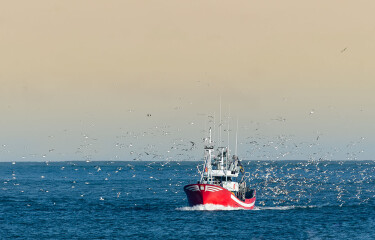The E.U. fishing industry has largely praised a preliminary ruling made by the Court of Justice of the European Union (CJEU) regarding zero-catch advice, stressing that the decision positively considers the well-being of companies, the economy, and the people involved in the industry, as well as environmental concerns.
The ruling clarified that E.U. ministers break the law if they approve the overfishing of target stocks, but that bycatch stocks in mixed fisheries, which is difficult for fishermen to avoid hauling in, is not a component in that declaration. The ruling follows a challenge brought forward by the nonprofit Friends of the Irish Environment (FIE), supported by environmental lawyers at ClientEarth, after the E.U. missed its stated legal deadline to end overfishing, which came and went in 2020.
In its ruling, the CJEU said E.U. ministers should be granted a level of flexibility when setting limits for fishing bycatch stocks and acknowledged it’s difficult to avoid netting unintended fish in these situations.
Welcoming the decision, European fisheries body Europêche said overly rigid zero-catch measures introduced for species caught in mixed fisheries would have brought devastating consequences.
Such consequences include the early closure of fisheries for E.U. vessels, even though fishers could still have had significant quotas for other species, Europêche said in a statement, noting that the fish that cause this issue – known as “choke species” – are incredibly problematic largely due to the “ill-conceived” E.U. landing obligation.
Europêche Managing Director Daniel Voces de Onaíndi told SeafoodSource the CJEU ruling constitutes an “important precedent in E.U. fisheries jurisprudence and for the interpretation of E.U. fisheries management policies.” It recognizes that for bycatch species in mixed fisheries, the European Council has a higher level of discretion, particularly in instances where the International Council for the Exploration of the Sea (ICES) issues zero-catch advice, Voces said.
“In such cases, the council possesses the authority to set [total allowable catch measures] above that advice level, preventing the premature closure of a fishery. Had the court affirmed strict adherence to ICES zero-catch advice, it would have been the end for many demersal fisheries in the Atlantic.”
According to Voces, the CJEU rightly recognized that fishery closures would significantly affect the economic viability of fishing fleets and the standard of living of the persons dependent on those activities, adding that this negative impact “clearly goes against” one of the core objectives of the E.U. Common Fisheries Policy, which requires fishing activities to be managed in ways that are consistent with the objectives of achieving economic, social, and employment benefits, as well as contributing to the availability of food supplies.
“In summary, the CJEU ruling provides the fishing fleet with the confidence that fisheries management can effectively address practical challenges, aligning more closely with the realities of fisheries,” he said.
While the CFP aims to achieve maximum sustainable yield (MSY) for all stocks, a recent parliamentary report on the policy determined that species management based on the MSY model is impossible to apply for multi-specific fisheries, even in the case of scientifically well-known and documented fisheries. Therefore, Voces said an effective quota system should include a fair degree of flexibility – enabling fishers to avoid choke situations in which they would rather avoid catch altogether than try to limit bycatch as much as possible in their quest for target species.
Voces said Europêche is keen to pursue a comprehensive review of the landing obligation, including a rework of its ...
Photo courtesy of cpg-photo/Shutterstock








